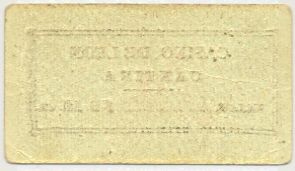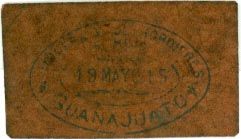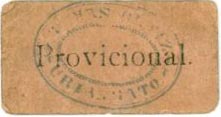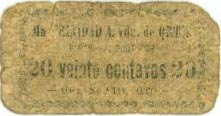Private issues
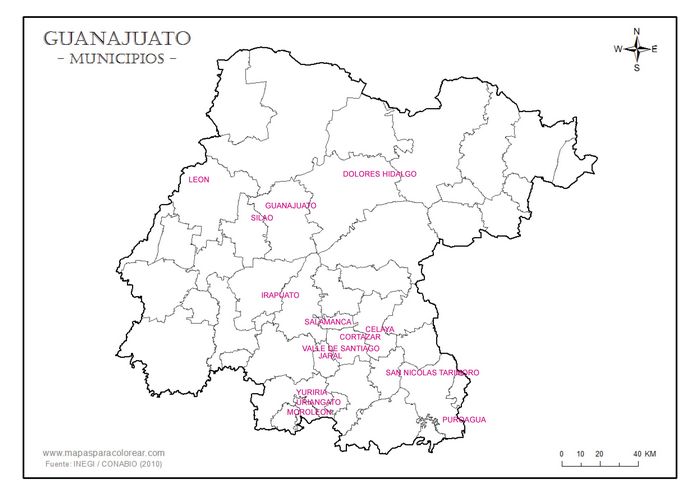
León
Casino de León
The Casino was part of a 1905 development in the Plaza Principal by the architect Luis Long in the neoclassical style with a neo-Mudéjar façade. It housed a shopping centre (under an advanced concept for the time) with the inclusion of the Lonja Mercantil (Commercial Market), also known as El Casino, which was established as a meeting space for the economic and social elite of León until the 1950s.
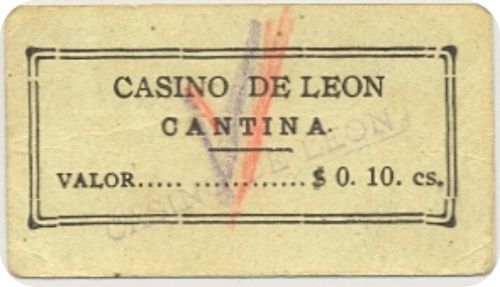
This 10c note was issued by the Casino's cantina.
Hotel “Mexico”
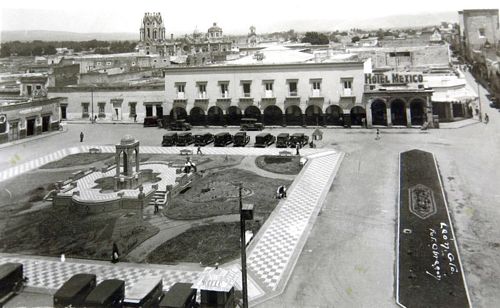
Plaza Principal, León, with Hotel “Mexico”
On 23 February 1916 the Presidente Municipal of León wrote to Guillermo Vera, the owner of the Hotel “Mexico”, that he had learnt that the hotel had issued fichas in various denomination to facilitate change. As Vera had no authority to issue them, if the Presidencia found out that they were still circulating, it would impose a heavy fineAHMLeón, Fondo Jefatura Política, Sección Jefatura Política, Series Comunicaciones, caja 6, exp. 28.
Guillermo Vera was the son of Spaniards but born in Mexico who opened his first hotel, the Hotel México, on calle Juárez facing the Plaza Principal. The building is now the Casa de Cultura.
Dolores Hidalgo
Hacienda Cerro Blanco y Anexas
Cerro Blanco is situated 19 kilometres south of Dolores Hidalgo.
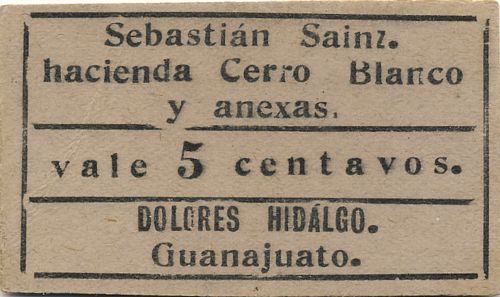
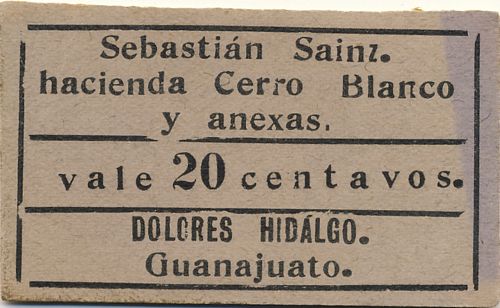
Sebastián Sainz was a Spaniard who was involved in the Compañía de Luz EléctricaLa Patria, Año XXVIII, Num. 8,349, 7 October 1904 and ran the “San Rafael” corn mill.
Guanajuato
Josefa S. de Hordieres e Hijo
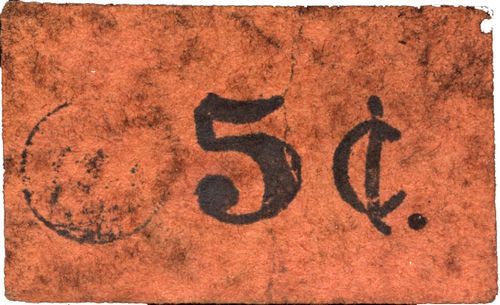
This note has a handstamp dated 19 May 1915 on the reverse.
Circulo Constitucionalista Guanajuatense
At the beginning of 1916, the state government, presided over by Colonel José Siurob, tried to reactivate social life, but accompanied by social reforms such as agrarian reform, based on Carranza’s Ley Agraria, and educational reform. So Siurob announced the inauguration of a "Círculo Constitucionalista Guanajuatense", designed for the recreation of public servants, as well as for the middle classes who did not exactly work in the public administration. It was to be located in the premises previously occupied by the Casino of Guanajuato, since these had apparently been abandoned during the armed struggle“Nuevo centro de reunión”, La Idea Libre, (AGuan, caja 532, exp. 13, foja, 11, 1916).
“Our congratulations to the State Government, for its efforts, we repeat, in rebuilding and amalgamating the healthy elements of a society that will know how to respond to the efforts of the triumphant Revolutionibid..
The enterprise was called the Casino Constitucionalista"Casino constitucionalista”, El Heraldo (AGuan, caja 489, exp. 8, foja 36, 1916).
However, José Siurob was dismissed a few months later, because Carranza felt that he was not showing a strong enough impulse towards the agricultural sector. The projects that Siurob had started were discontinued by the new interim governor, General Fernando Dávila, who argued that that these social programs would impose a great burden on the treasury.
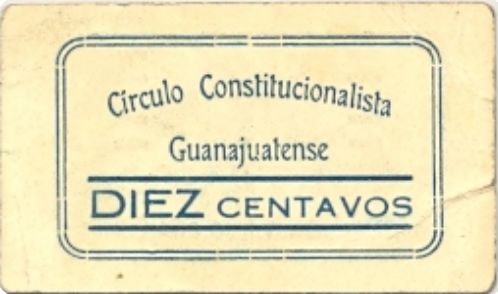
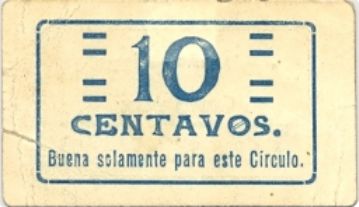
This 10c note was for use only within the club.
Salamanca
We should also note the issues of the Junta Directiva del Comercio Local in Salamanca.
Pénjamo
La Compañía de Tranvias
In [ ] 1915 the Presidente Municipal of Pénjamo, Capitán de la Peña, authorised the Compañía de Tranvias to issue $300 in fichas, to ease the shortage of change. This issue was guaranteed by a deposit in the Tesorería Municipal.
Angel [ ]
De la Peña also authorised five casas comerciales to issue valesAHEG, Fondo Secretario de Gobierno, Secciones de Gobierno, Primer Departamento, 1915, caja 9 informe of Teniente Coronel Gilberto Navarro, Inspector de Presidencias Municipales, 7 December 1915.
One of these might have been Angel [ ][identification needed].
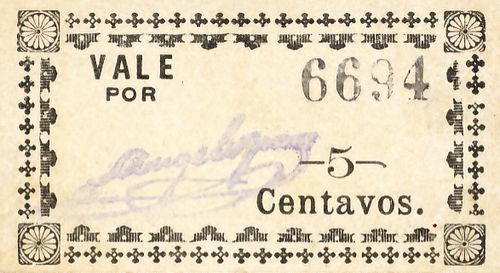
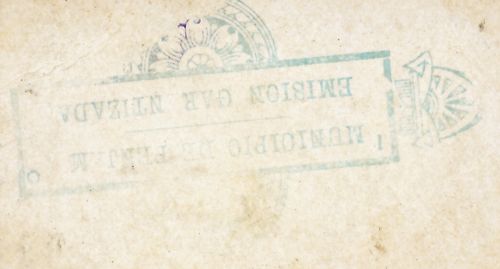
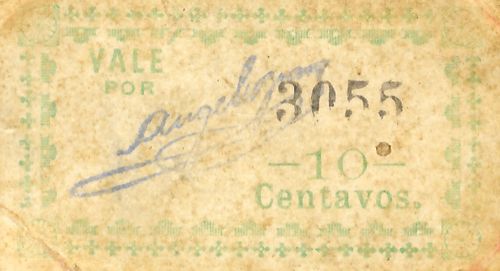
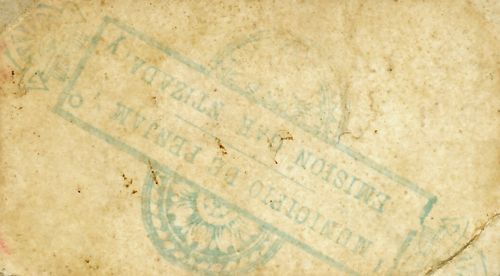
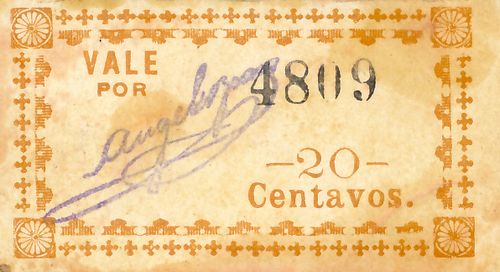
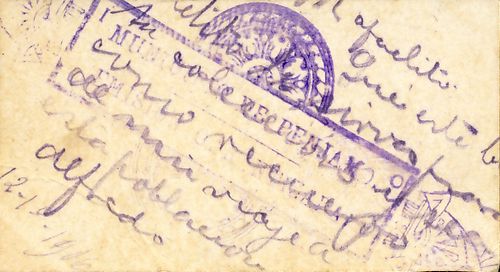
| from | to | total number |
total value |
||
| 5c | includes number 6694 | ||||
| 10c | includes number 3055 | ||||
| 20c | includes numbers 157CNBanxico #11038 to 4809 |
These have a stamp reading 'MUNICIPIO DE PENJAMO – EMISION GARANTIZADA' on the reverse and the facsimile signature of Angel or Angelo [ ][identification needed] on the face.
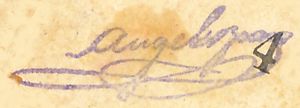 |
[ ]
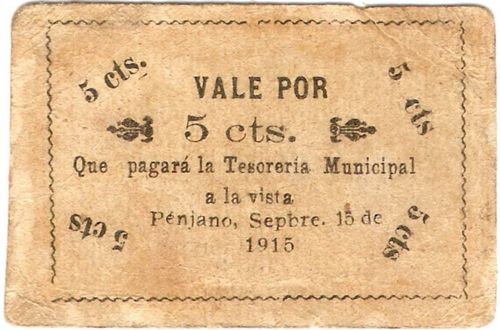
This 5c note, because of its date, 15 September 1915, was probably a private issue, even though it states that it will be payable on demand in the Tesorería Municipal and so is catalogued as a municipal issue. The validating stamp on the reverse no doubt was of the issuer.
These issues were withdrawn when the new Presidente Municipal, Angel G. Bravo, replaced them with a municipal issue in November 1915AHEG, Fondo Secretario de Gobierno, Secciones de Gobierno, Primer Departamento, 1915, caja 9 informe of Teniente Coronel Gilberto Navarro, Inspector de Presidencias Municipales, 7 December 1915.
Irapuato
El Caballo de Bronce
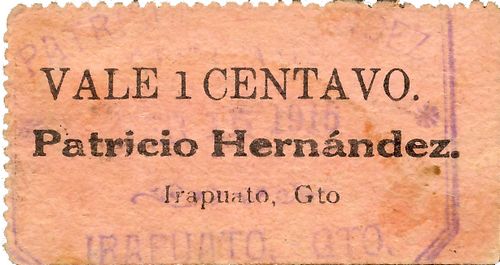
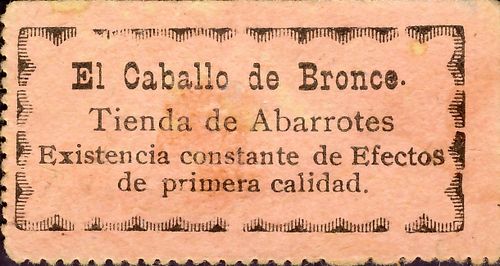
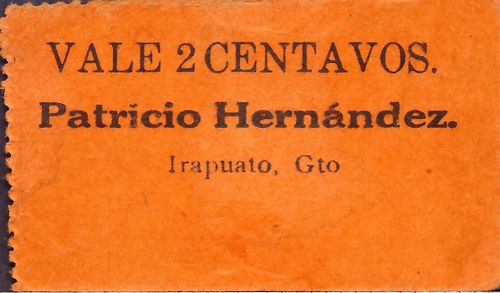
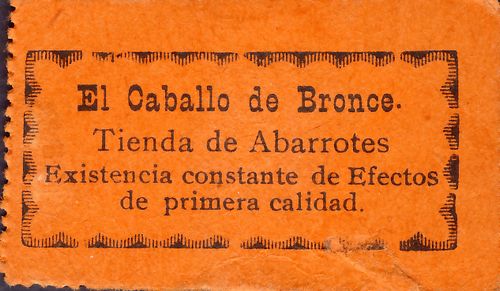
These were notes issued by "El Caballo de Bronce",a grocery owned by Patricio Hernández. Some of these were dated 15 February 1915.
Celaya
Casino Velasco
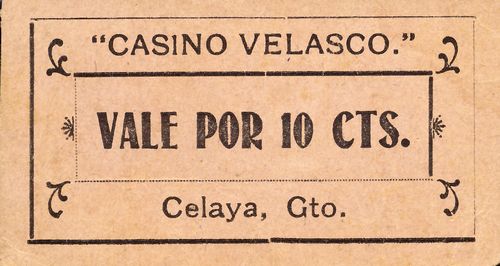
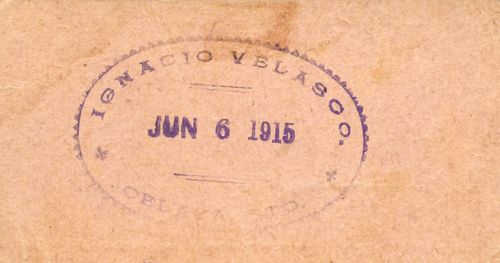
Ignacio Velasco was jefe político of Celaya in 1914-1915.
Cortazar
Hacienda de el Pintor
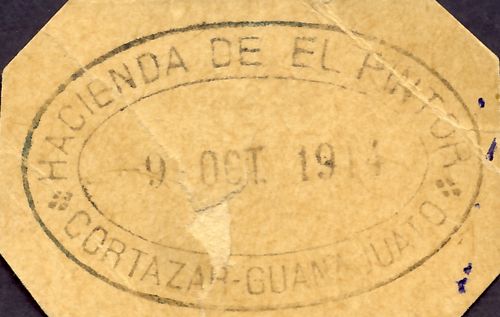
Valle de Santiago
El Centro Mercantil
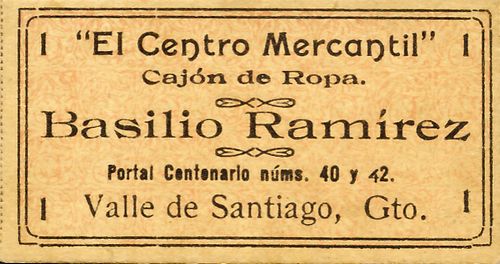
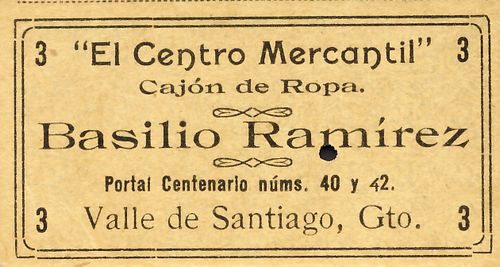
These might be vales for 1c and 3c but since they do not have a centavo symbol they are more likely to be numbers 1 and 3 in a series of adjoined coupons.
Basilio Ramírez Ruiz, proprietor of "El Centro Mercantil", was Presidente Municipal in 1928.
Jaral
El Golfo de México
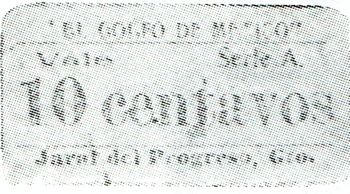
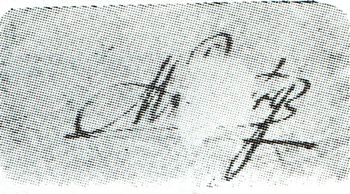
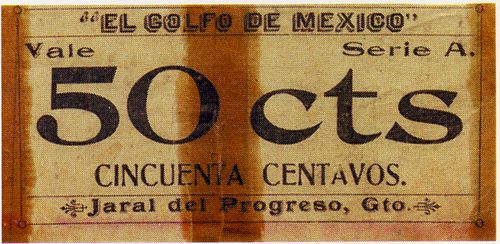
Yuriria
A couple of businesses in Yuriria issued notes, both specifically vales provisionales because of a shortage of small change. We should also note the issue of the Junta Comercial del Distrito de Yuriria, and include "La Ambar" of Pedro Zavala.
J. Jesús Gómez
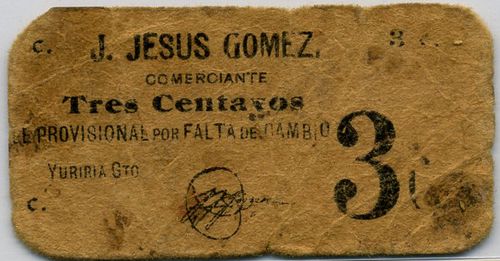
| J. Jesús Gómez | 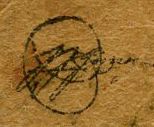 |
Jesús Echeverría
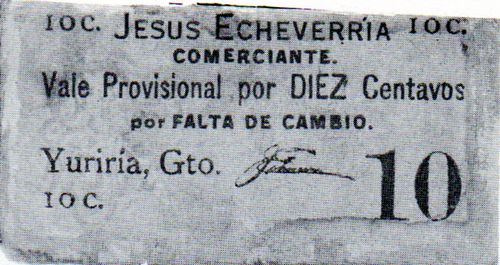
A rose-purple. undated, note for 10c.
| Jesús Echeverría was jefe político in 1913, 1914 and 1916. |  |
Uriangato
We know of three local issues from Uriangato.
Antonio Ortega
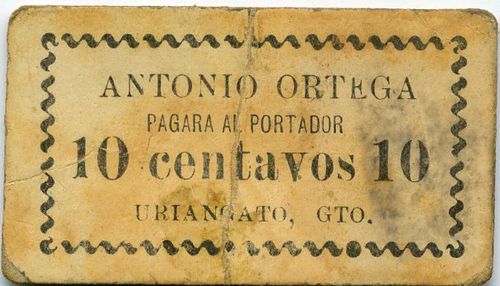
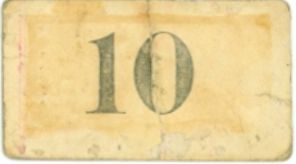
At the beginning of the twentieth century Antonio Ortega owned a factory producing aguadiente.
J. Ines Castro
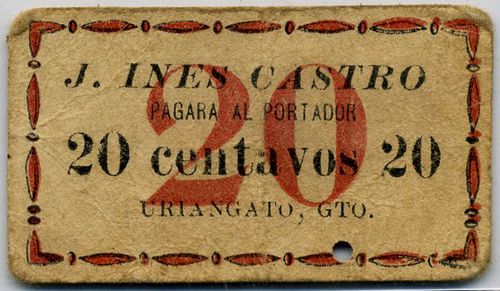
Maria Trinidad A. Vda. de Ortiz
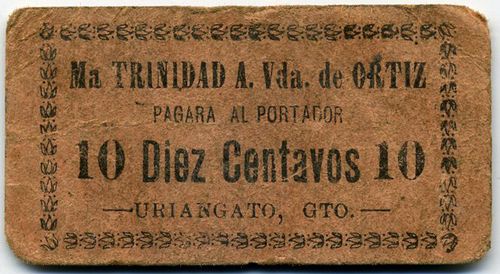
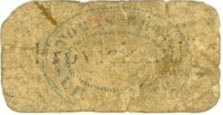
Moroleón
A couple of businesses issued individual vales. We should also note a joint effort by businesses.
La Luz del Siglo
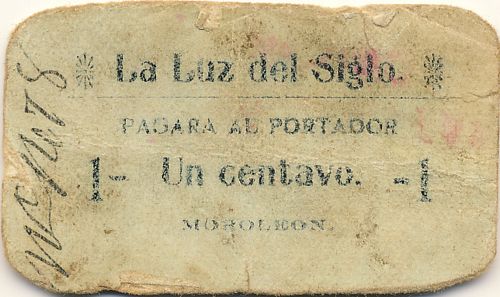
Rafael L. Mendoza
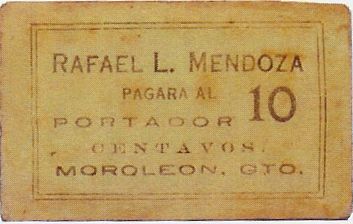
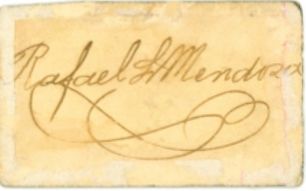
| Rafael L. Mendoza | 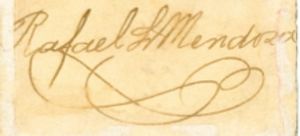 |
San Nicolás Tarimoro
Hacienda de San Nicolás Tarimoro
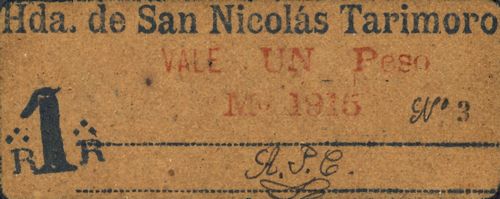
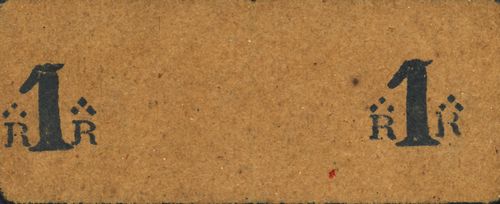
| to | from | total number |
total value |
||
| $1 | includes numbers 3 to 113CNBanxico #11071 |
Puruagua
Puruagua is in the municipio of Jerécuaro.
Hacienda de Puroagua (sic)
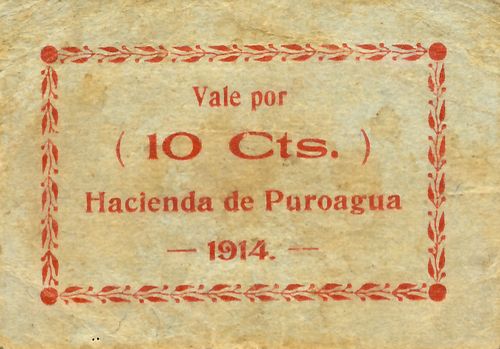
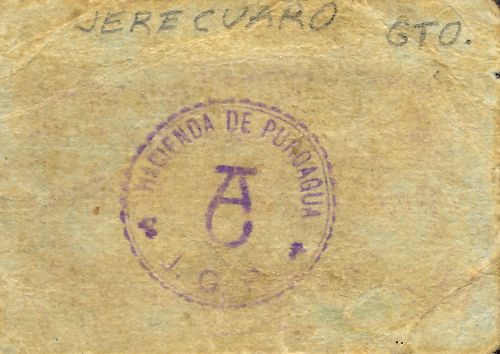
The wealthy family of Gómez de Parada owned the hacienda de Puruagua, of more than 25,000 hectares, whose main products were corn, beans, wheat and chili peppers.
This is an early note, dated 1914. The initials 'JGP' in the stamp on the reverse stands for Jorge Gómez de Parada Valdivielso. Jorge Gómez was born in Mexico City on 10 December 1851, and died there on 31 October 1920, at the age of 68.
The estate had polo fields and tennis courts, and Jorge’s third son, Jorge Gómez de Parada y Buch (23 April 1885 – 15 January 1965) played football internationally for Mexico and served as President of the Mexico polo and football federations.
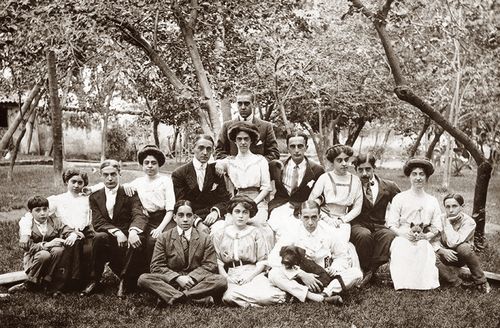
A photo of the family in the garden of the hacienda of Puruagua in 1911, including the younger Jorge with his dog Ruffo. They are without doubt much better dressed than the users of their vales.
The family had their main residence at 114 Paseo de la Reforma, Mexico City, designed in 1900 by the architect Manuel Robleda y GuerraFor more information, see https://grandescasasdemexico.blogspot.com/2016/04/casa-gomez-de-paradabuch-en-paso-de-la.html.
[ ]
José C. Torres
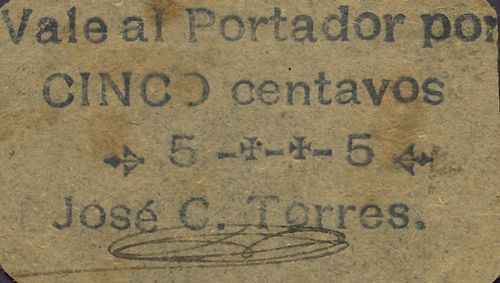
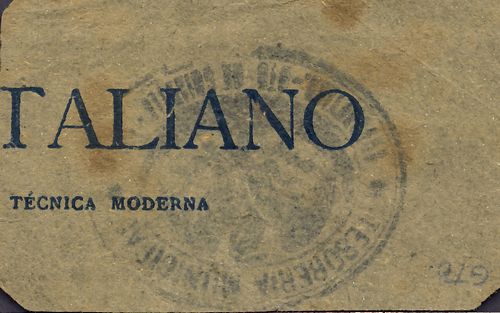
The name of the Tesorería Municipal that authorised this issue is illegible, at least to me.
Also in the catalogues are various issues from tram companies. Some of these could have been used as small change, though documentary evidence is needed before we can be certain that they should be included as paper currency.
Guanajuato
Cia. Limitada de Tranvías del Centro
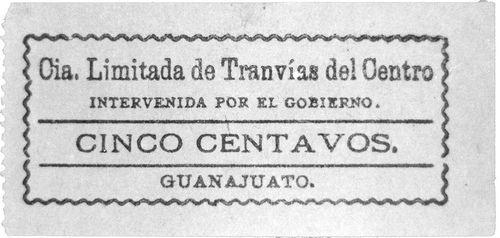
León
Cia. Limitada de Tranvías del Centro
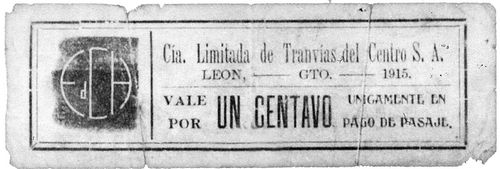
This was issued while the company had been taken over by the government (Intervenida por el Gobierno).
Moroleón
Tranvías Urbanos
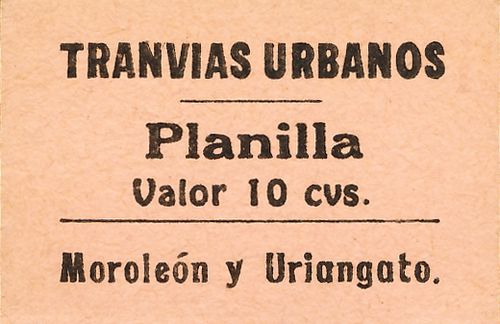
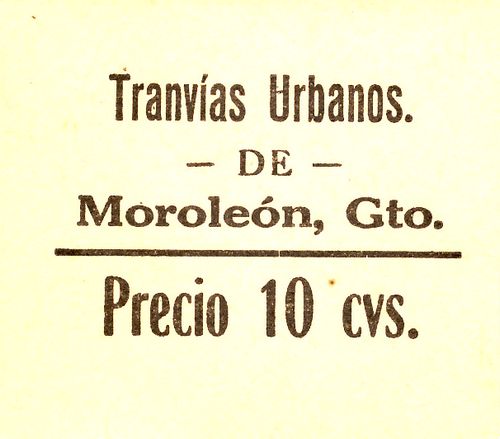
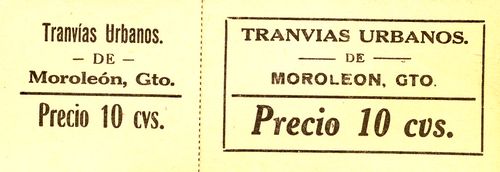
Silao
Ferrocarril Urbano S.A.
[image needed]

